MGT604: Summary of Articles on Bribery in International Business
VerifiedAdded on 2023/01/18
|10
|2426
|88
Report
AI Summary
This report provides a comprehensive summary of five articles concerning bribery in international business. The articles explore various strategies to mitigate corruption, including the implementation of training programs focused on corporate ethics, fostering cultural understanding among employees, and utilizing IT applications for monitoring business activities. The authors emphasize the importance of strong leadership, ethical governance, and adherence to international standards like the UN Convention against Corruption. The articles highlight the impact of cultural differences, stakeholder management, and transparency on ethical decision-making. They also discuss the role of anti-corruption bodies like Transparency International and the long-term benefits of ethical practices in building goodwill and brand equity. The report concludes by emphasizing the significance of ethical behavior, cultural sensitivity, and proactive measures in preventing bribery and promoting sustainable business practices in the global arena.
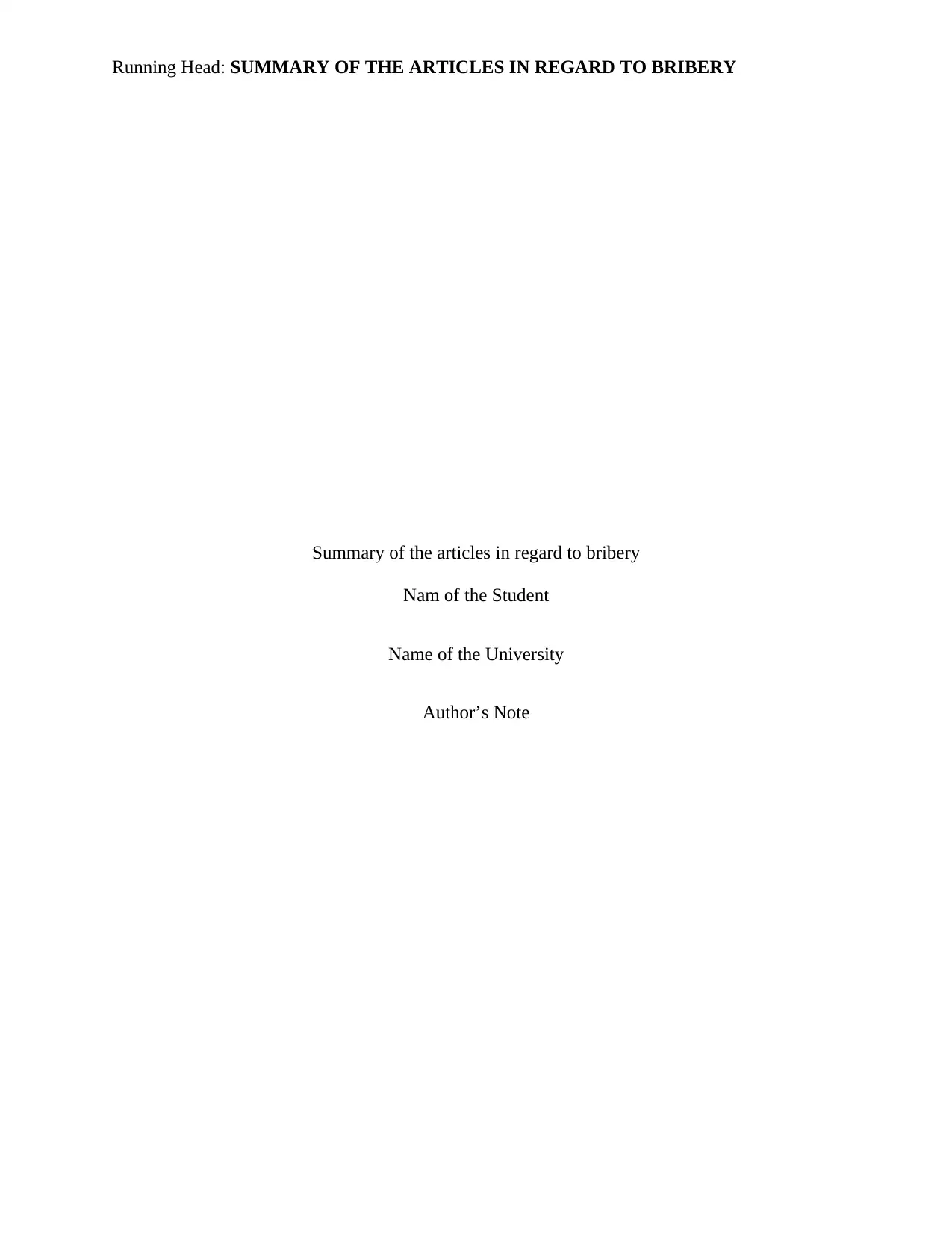
Running Head: SUMMARY OF THE ARTICLES IN REGARD TO BRIBERY
Summary of the articles in regard to bribery
Nam of the Student
Name of the University
Author’s Note
Summary of the articles in regard to bribery
Nam of the Student
Name of the University
Author’s Note
Paraphrase This Document
Need a fresh take? Get an instant paraphrase of this document with our AI Paraphraser
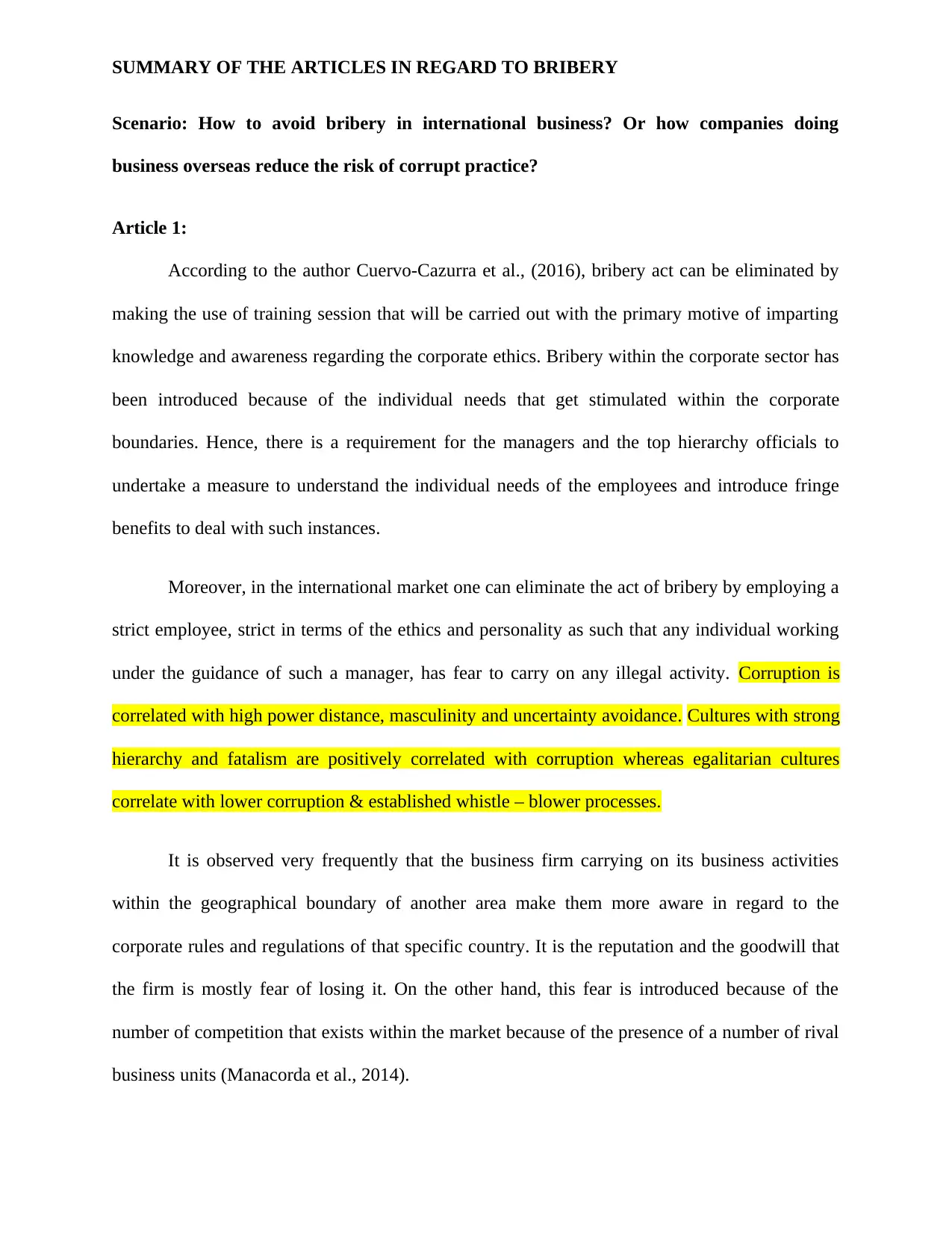
SUMMARY OF THE ARTICLES IN REGARD TO BRIBERY
Scenario: How to avoid bribery in international business? Or how companies doing
business overseas reduce the risk of corrupt practice?
Article 1:
According to the author Cuervo-Cazurra et al., (2016), bribery act can be eliminated by
making the use of training session that will be carried out with the primary motive of imparting
knowledge and awareness regarding the corporate ethics. Bribery within the corporate sector has
been introduced because of the individual needs that get stimulated within the corporate
boundaries. Hence, there is a requirement for the managers and the top hierarchy officials to
undertake a measure to understand the individual needs of the employees and introduce fringe
benefits to deal with such instances.
Moreover, in the international market one can eliminate the act of bribery by employing a
strict employee, strict in terms of the ethics and personality as such that any individual working
under the guidance of such a manager, has fear to carry on any illegal activity. Corruption is
correlated with high power distance, masculinity and uncertainty avoidance. Cultures with strong
hierarchy and fatalism are positively correlated with corruption whereas egalitarian cultures
correlate with lower corruption & established whistle – blower processes.
It is observed very frequently that the business firm carrying on its business activities
within the geographical boundary of another area make them more aware in regard to the
corporate rules and regulations of that specific country. It is the reputation and the goodwill that
the firm is mostly fear of losing it. On the other hand, this fear is introduced because of the
number of competition that exists within the market because of the presence of a number of rival
business units (Manacorda et al., 2014).
Scenario: How to avoid bribery in international business? Or how companies doing
business overseas reduce the risk of corrupt practice?
Article 1:
According to the author Cuervo-Cazurra et al., (2016), bribery act can be eliminated by
making the use of training session that will be carried out with the primary motive of imparting
knowledge and awareness regarding the corporate ethics. Bribery within the corporate sector has
been introduced because of the individual needs that get stimulated within the corporate
boundaries. Hence, there is a requirement for the managers and the top hierarchy officials to
undertake a measure to understand the individual needs of the employees and introduce fringe
benefits to deal with such instances.
Moreover, in the international market one can eliminate the act of bribery by employing a
strict employee, strict in terms of the ethics and personality as such that any individual working
under the guidance of such a manager, has fear to carry on any illegal activity. Corruption is
correlated with high power distance, masculinity and uncertainty avoidance. Cultures with strong
hierarchy and fatalism are positively correlated with corruption whereas egalitarian cultures
correlate with lower corruption & established whistle – blower processes.
It is observed very frequently that the business firm carrying on its business activities
within the geographical boundary of another area make them more aware in regard to the
corporate rules and regulations of that specific country. It is the reputation and the goodwill that
the firm is mostly fear of losing it. On the other hand, this fear is introduced because of the
number of competition that exists within the market because of the presence of a number of rival
business units (Manacorda et al., 2014).
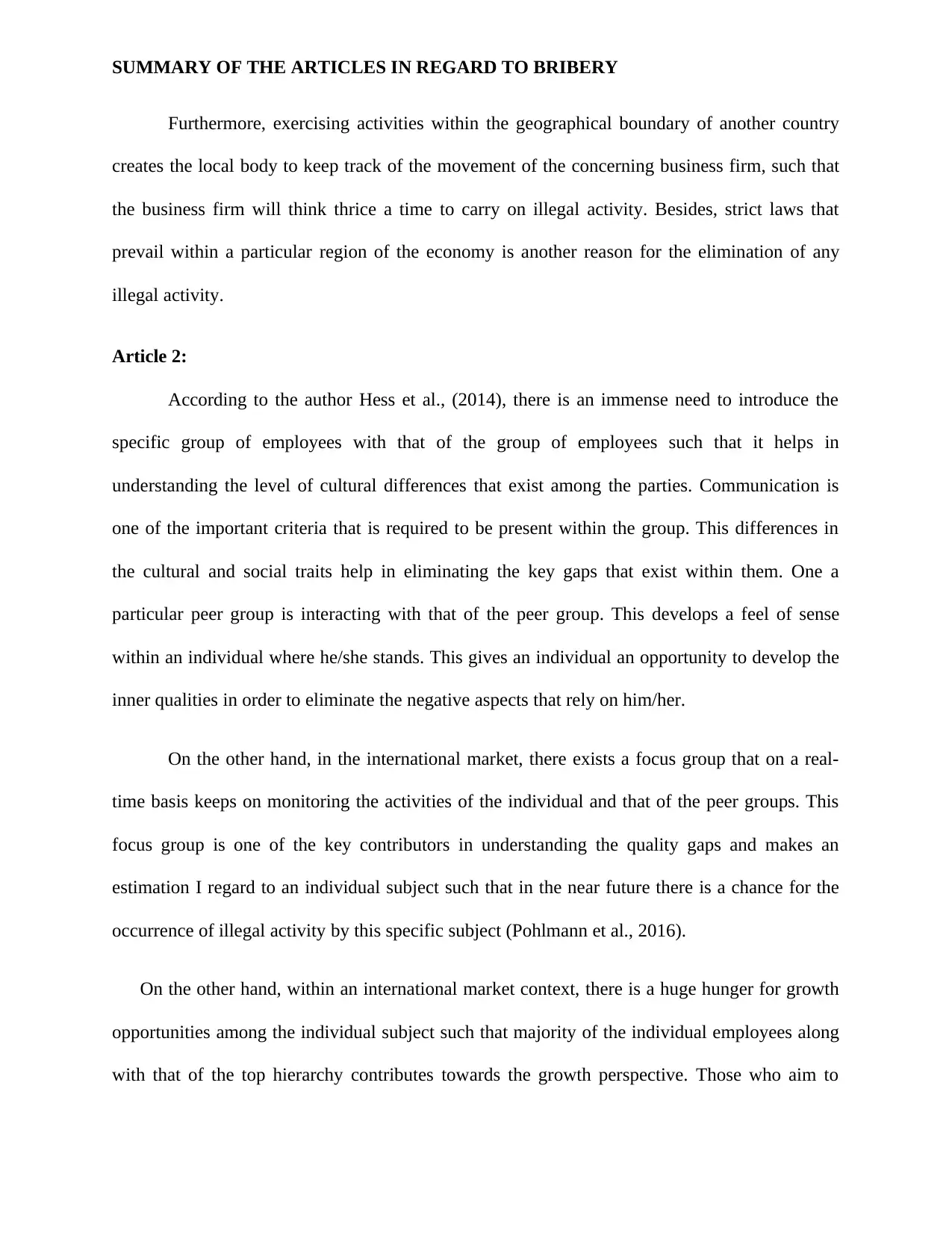
SUMMARY OF THE ARTICLES IN REGARD TO BRIBERY
Furthermore, exercising activities within the geographical boundary of another country
creates the local body to keep track of the movement of the concerning business firm, such that
the business firm will think thrice a time to carry on illegal activity. Besides, strict laws that
prevail within a particular region of the economy is another reason for the elimination of any
illegal activity.
Article 2:
According to the author Hess et al., (2014), there is an immense need to introduce the
specific group of employees with that of the group of employees such that it helps in
understanding the level of cultural differences that exist among the parties. Communication is
one of the important criteria that is required to be present within the group. This differences in
the cultural and social traits help in eliminating the key gaps that exist within them. One a
particular peer group is interacting with that of the peer group. This develops a feel of sense
within an individual where he/she stands. This gives an individual an opportunity to develop the
inner qualities in order to eliminate the negative aspects that rely on him/her.
On the other hand, in the international market, there exists a focus group that on a real-
time basis keeps on monitoring the activities of the individual and that of the peer groups. This
focus group is one of the key contributors in understanding the quality gaps and makes an
estimation I regard to an individual subject such that in the near future there is a chance for the
occurrence of illegal activity by this specific subject (Pohlmann et al., 2016).
On the other hand, within an international market context, there is a huge hunger for growth
opportunities among the individual subject such that majority of the individual employees along
with that of the top hierarchy contributes towards the growth perspective. Those who aim to
Furthermore, exercising activities within the geographical boundary of another country
creates the local body to keep track of the movement of the concerning business firm, such that
the business firm will think thrice a time to carry on illegal activity. Besides, strict laws that
prevail within a particular region of the economy is another reason for the elimination of any
illegal activity.
Article 2:
According to the author Hess et al., (2014), there is an immense need to introduce the
specific group of employees with that of the group of employees such that it helps in
understanding the level of cultural differences that exist among the parties. Communication is
one of the important criteria that is required to be present within the group. This differences in
the cultural and social traits help in eliminating the key gaps that exist within them. One a
particular peer group is interacting with that of the peer group. This develops a feel of sense
within an individual where he/she stands. This gives an individual an opportunity to develop the
inner qualities in order to eliminate the negative aspects that rely on him/her.
On the other hand, in the international market, there exists a focus group that on a real-
time basis keeps on monitoring the activities of the individual and that of the peer groups. This
focus group is one of the key contributors in understanding the quality gaps and makes an
estimation I regard to an individual subject such that in the near future there is a chance for the
occurrence of illegal activity by this specific subject (Pohlmann et al., 2016).
On the other hand, within an international market context, there is a huge hunger for growth
opportunities among the individual subject such that majority of the individual employees along
with that of the top hierarchy contributes towards the growth perspective. Those who aim to
⊘ This is a preview!⊘
Do you want full access?
Subscribe today to unlock all pages.

Trusted by 1+ million students worldwide
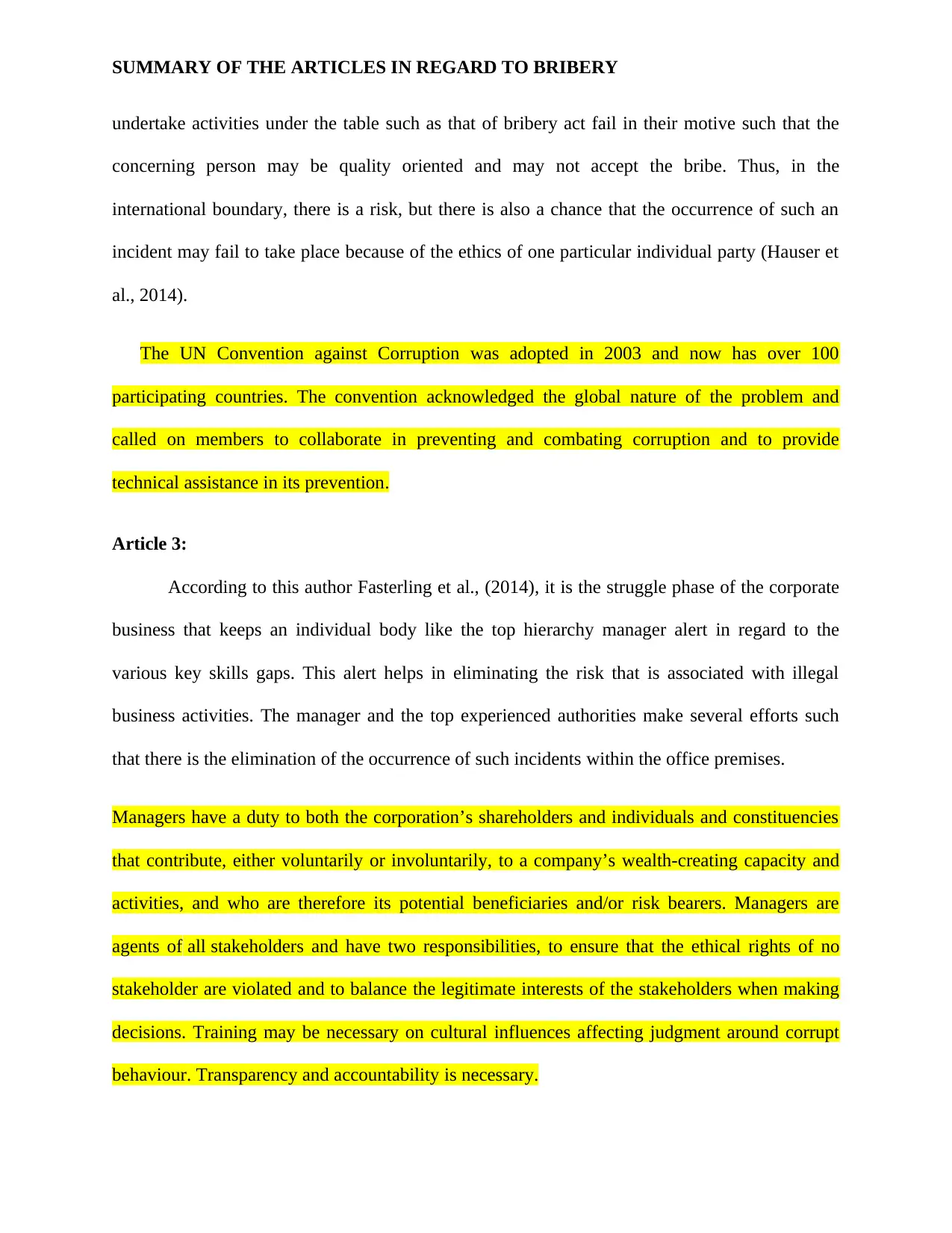
SUMMARY OF THE ARTICLES IN REGARD TO BRIBERY
undertake activities under the table such as that of bribery act fail in their motive such that the
concerning person may be quality oriented and may not accept the bribe. Thus, in the
international boundary, there is a risk, but there is also a chance that the occurrence of such an
incident may fail to take place because of the ethics of one particular individual party (Hauser et
al., 2014).
The UN Convention against Corruption was adopted in 2003 and now has over 100
participating countries. The convention acknowledged the global nature of the problem and
called on members to collaborate in preventing and combating corruption and to provide
technical assistance in its prevention.
Article 3:
According to this author Fasterling et al., (2014), it is the struggle phase of the corporate
business that keeps an individual body like the top hierarchy manager alert in regard to the
various key skills gaps. This alert helps in eliminating the risk that is associated with illegal
business activities. The manager and the top experienced authorities make several efforts such
that there is the elimination of the occurrence of such incidents within the office premises.
Managers have a duty to both the corporation’s shareholders and individuals and constituencies
that contribute, either voluntarily or involuntarily, to a company’s wealth-creating capacity and
activities, and who are therefore its potential beneficiaries and/or risk bearers. Managers are
agents of all stakeholders and have two responsibilities, to ensure that the ethical rights of no
stakeholder are violated and to balance the legitimate interests of the stakeholders when making
decisions. Training may be necessary on cultural influences affecting judgment around corrupt
behaviour. Transparency and accountability is necessary.
undertake activities under the table such as that of bribery act fail in their motive such that the
concerning person may be quality oriented and may not accept the bribe. Thus, in the
international boundary, there is a risk, but there is also a chance that the occurrence of such an
incident may fail to take place because of the ethics of one particular individual party (Hauser et
al., 2014).
The UN Convention against Corruption was adopted in 2003 and now has over 100
participating countries. The convention acknowledged the global nature of the problem and
called on members to collaborate in preventing and combating corruption and to provide
technical assistance in its prevention.
Article 3:
According to this author Fasterling et al., (2014), it is the struggle phase of the corporate
business that keeps an individual body like the top hierarchy manager alert in regard to the
various key skills gaps. This alert helps in eliminating the risk that is associated with illegal
business activities. The manager and the top experienced authorities make several efforts such
that there is the elimination of the occurrence of such incidents within the office premises.
Managers have a duty to both the corporation’s shareholders and individuals and constituencies
that contribute, either voluntarily or involuntarily, to a company’s wealth-creating capacity and
activities, and who are therefore its potential beneficiaries and/or risk bearers. Managers are
agents of all stakeholders and have two responsibilities, to ensure that the ethical rights of no
stakeholder are violated and to balance the legitimate interests of the stakeholders when making
decisions. Training may be necessary on cultural influences affecting judgment around corrupt
behaviour. Transparency and accountability is necessary.
Paraphrase This Document
Need a fresh take? Get an instant paraphrase of this document with our AI Paraphraser
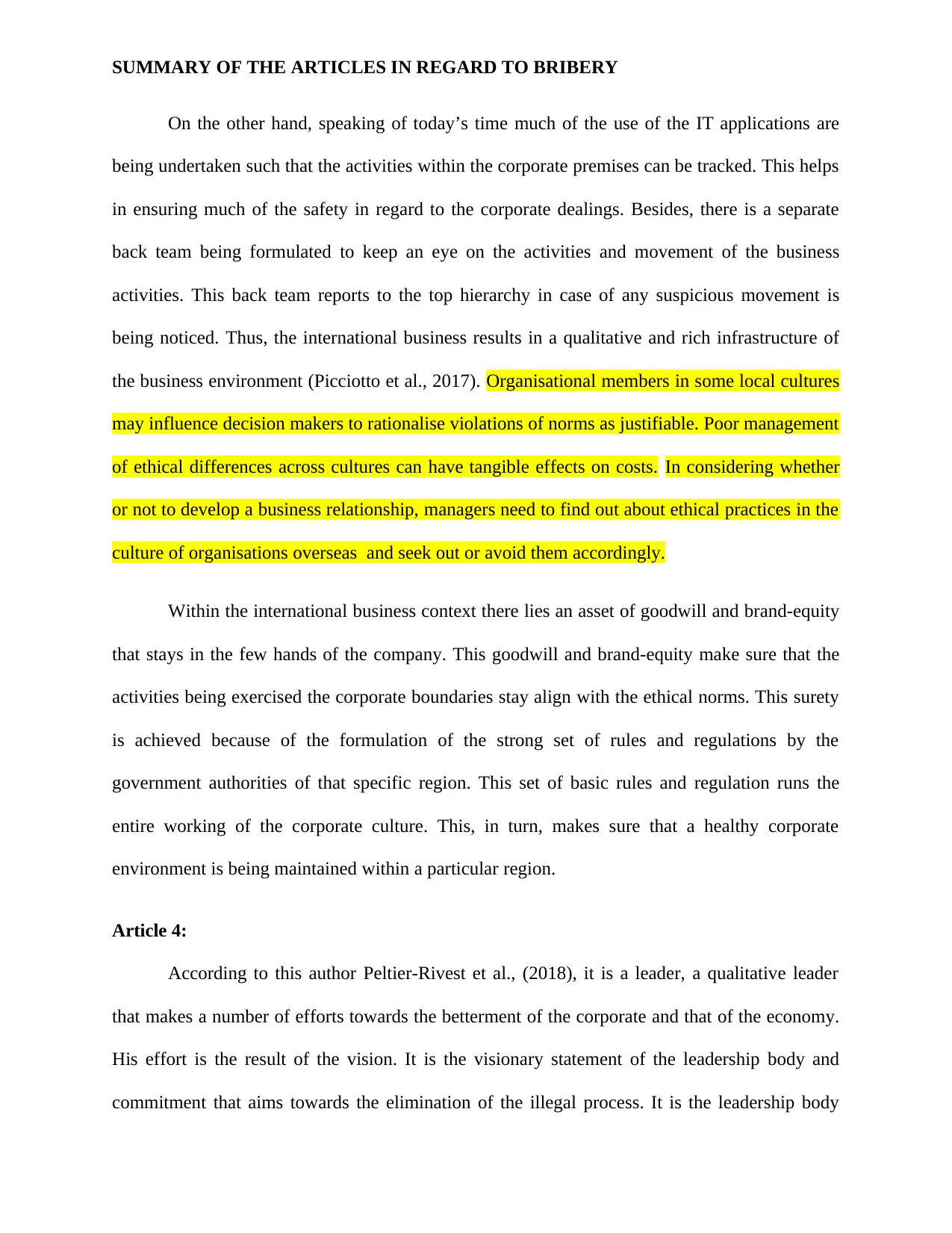
SUMMARY OF THE ARTICLES IN REGARD TO BRIBERY
On the other hand, speaking of today’s time much of the use of the IT applications are
being undertaken such that the activities within the corporate premises can be tracked. This helps
in ensuring much of the safety in regard to the corporate dealings. Besides, there is a separate
back team being formulated to keep an eye on the activities and movement of the business
activities. This back team reports to the top hierarchy in case of any suspicious movement is
being noticed. Thus, the international business results in a qualitative and rich infrastructure of
the business environment (Picciotto et al., 2017). Organisational members in some local cultures
may influence decision makers to rationalise violations of norms as justifiable. Poor management
of ethical differences across cultures can have tangible effects on costs. In considering whether
or not to develop a business relationship, managers need to find out about ethical practices in the
culture of organisations overseas and seek out or avoid them accordingly.
Within the international business context there lies an asset of goodwill and brand-equity
that stays in the few hands of the company. This goodwill and brand-equity make sure that the
activities being exercised the corporate boundaries stay align with the ethical norms. This surety
is achieved because of the formulation of the strong set of rules and regulations by the
government authorities of that specific region. This set of basic rules and regulation runs the
entire working of the corporate culture. This, in turn, makes sure that a healthy corporate
environment is being maintained within a particular region.
Article 4:
According to this author Peltier-Rivest et al., (2018), it is a leader, a qualitative leader
that makes a number of efforts towards the betterment of the corporate and that of the economy.
His effort is the result of the vision. It is the visionary statement of the leadership body and
commitment that aims towards the elimination of the illegal process. It is the leadership body
On the other hand, speaking of today’s time much of the use of the IT applications are
being undertaken such that the activities within the corporate premises can be tracked. This helps
in ensuring much of the safety in regard to the corporate dealings. Besides, there is a separate
back team being formulated to keep an eye on the activities and movement of the business
activities. This back team reports to the top hierarchy in case of any suspicious movement is
being noticed. Thus, the international business results in a qualitative and rich infrastructure of
the business environment (Picciotto et al., 2017). Organisational members in some local cultures
may influence decision makers to rationalise violations of norms as justifiable. Poor management
of ethical differences across cultures can have tangible effects on costs. In considering whether
or not to develop a business relationship, managers need to find out about ethical practices in the
culture of organisations overseas and seek out or avoid them accordingly.
Within the international business context there lies an asset of goodwill and brand-equity
that stays in the few hands of the company. This goodwill and brand-equity make sure that the
activities being exercised the corporate boundaries stay align with the ethical norms. This surety
is achieved because of the formulation of the strong set of rules and regulations by the
government authorities of that specific region. This set of basic rules and regulation runs the
entire working of the corporate culture. This, in turn, makes sure that a healthy corporate
environment is being maintained within a particular region.
Article 4:
According to this author Peltier-Rivest et al., (2018), it is a leader, a qualitative leader
that makes a number of efforts towards the betterment of the corporate and that of the economy.
His effort is the result of the vision. It is the visionary statement of the leadership body and
commitment that aims towards the elimination of the illegal process. It is the leadership body
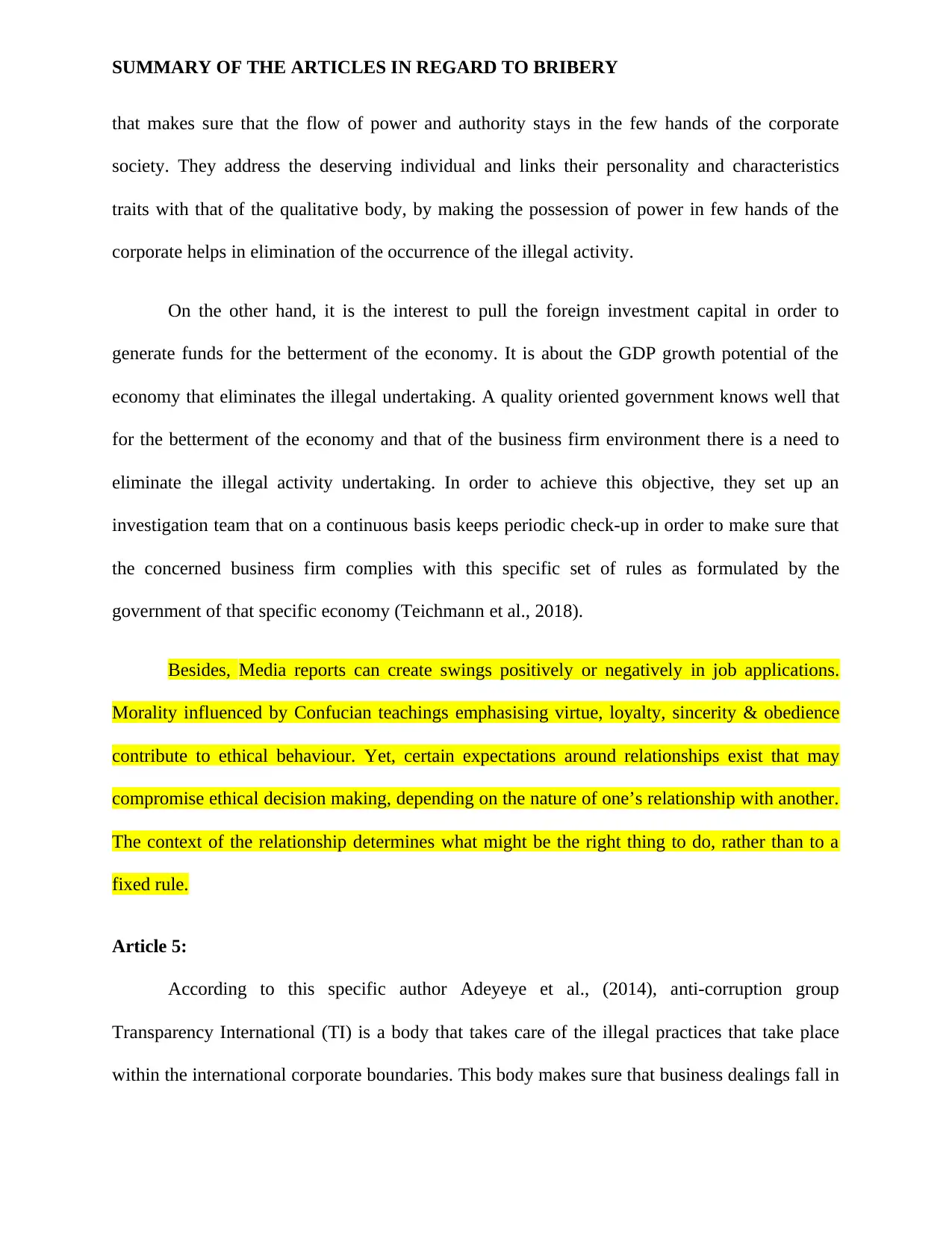
SUMMARY OF THE ARTICLES IN REGARD TO BRIBERY
that makes sure that the flow of power and authority stays in the few hands of the corporate
society. They address the deserving individual and links their personality and characteristics
traits with that of the qualitative body, by making the possession of power in few hands of the
corporate helps in elimination of the occurrence of the illegal activity.
On the other hand, it is the interest to pull the foreign investment capital in order to
generate funds for the betterment of the economy. It is about the GDP growth potential of the
economy that eliminates the illegal undertaking. A quality oriented government knows well that
for the betterment of the economy and that of the business firm environment there is a need to
eliminate the illegal activity undertaking. In order to achieve this objective, they set up an
investigation team that on a continuous basis keeps periodic check-up in order to make sure that
the concerned business firm complies with this specific set of rules as formulated by the
government of that specific economy (Teichmann et al., 2018).
Besides, Media reports can create swings positively or negatively in job applications.
Morality influenced by Confucian teachings emphasising virtue, loyalty, sincerity & obedience
contribute to ethical behaviour. Yet, certain expectations around relationships exist that may
compromise ethical decision making, depending on the nature of one’s relationship with another.
The context of the relationship determines what might be the right thing to do, rather than to a
fixed rule.
Article 5:
According to this specific author Adeyeye et al., (2014), anti-corruption group
Transparency International (TI) is a body that takes care of the illegal practices that take place
within the international corporate boundaries. This body makes sure that business dealings fall in
that makes sure that the flow of power and authority stays in the few hands of the corporate
society. They address the deserving individual and links their personality and characteristics
traits with that of the qualitative body, by making the possession of power in few hands of the
corporate helps in elimination of the occurrence of the illegal activity.
On the other hand, it is the interest to pull the foreign investment capital in order to
generate funds for the betterment of the economy. It is about the GDP growth potential of the
economy that eliminates the illegal undertaking. A quality oriented government knows well that
for the betterment of the economy and that of the business firm environment there is a need to
eliminate the illegal activity undertaking. In order to achieve this objective, they set up an
investigation team that on a continuous basis keeps periodic check-up in order to make sure that
the concerned business firm complies with this specific set of rules as formulated by the
government of that specific economy (Teichmann et al., 2018).
Besides, Media reports can create swings positively or negatively in job applications.
Morality influenced by Confucian teachings emphasising virtue, loyalty, sincerity & obedience
contribute to ethical behaviour. Yet, certain expectations around relationships exist that may
compromise ethical decision making, depending on the nature of one’s relationship with another.
The context of the relationship determines what might be the right thing to do, rather than to a
fixed rule.
Article 5:
According to this specific author Adeyeye et al., (2014), anti-corruption group
Transparency International (TI) is a body that takes care of the illegal practices that take place
within the international corporate boundaries. This body makes sure that business dealings fall in
⊘ This is a preview!⊘
Do you want full access?
Subscribe today to unlock all pages.

Trusted by 1+ million students worldwide
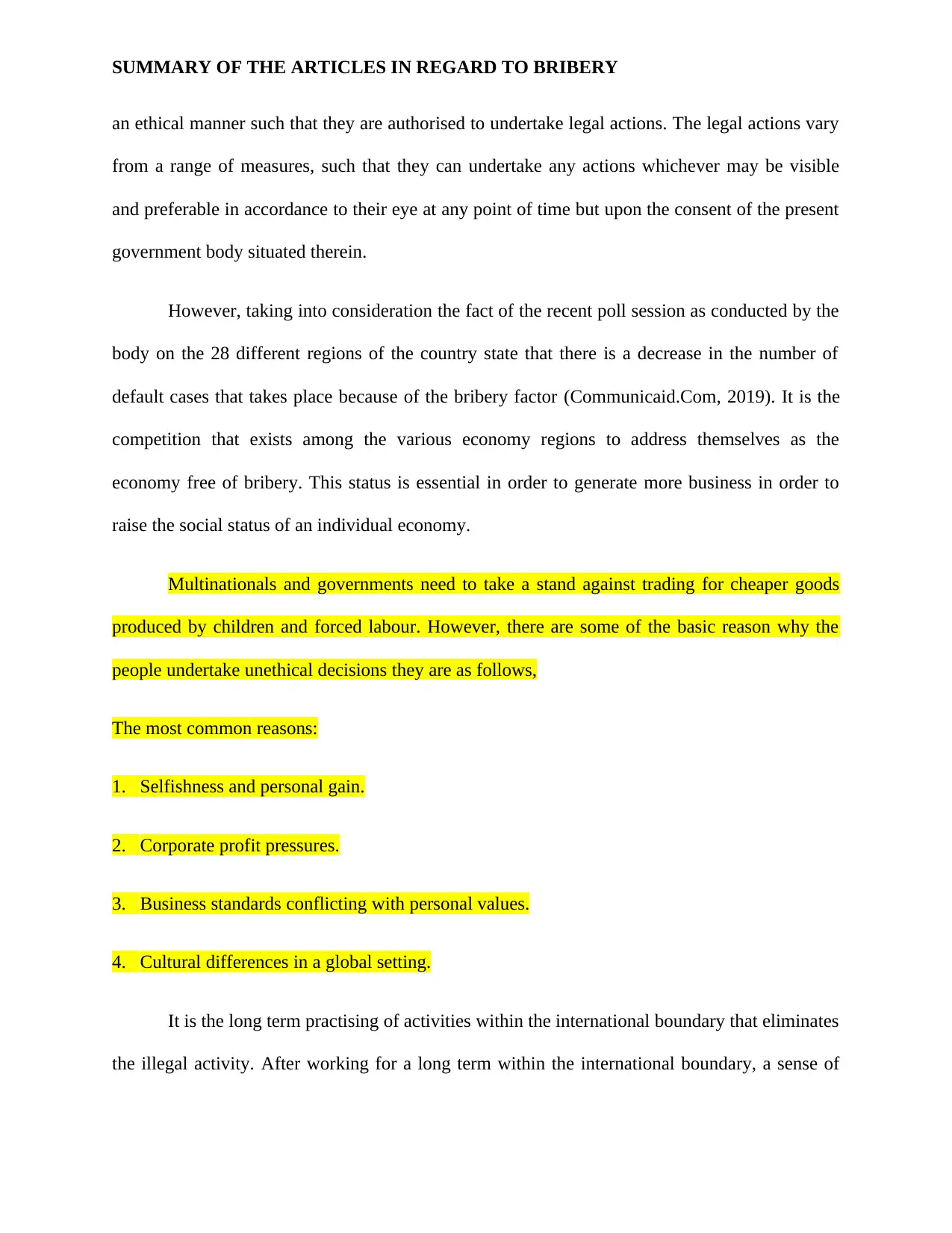
SUMMARY OF THE ARTICLES IN REGARD TO BRIBERY
an ethical manner such that they are authorised to undertake legal actions. The legal actions vary
from a range of measures, such that they can undertake any actions whichever may be visible
and preferable in accordance to their eye at any point of time but upon the consent of the present
government body situated therein.
However, taking into consideration the fact of the recent poll session as conducted by the
body on the 28 different regions of the country state that there is a decrease in the number of
default cases that takes place because of the bribery factor (Communicaid.Com, 2019). It is the
competition that exists among the various economy regions to address themselves as the
economy free of bribery. This status is essential in order to generate more business in order to
raise the social status of an individual economy.
Multinationals and governments need to take a stand against trading for cheaper goods
produced by children and forced labour. However, there are some of the basic reason why the
people undertake unethical decisions they are as follows,
The most common reasons:
1. Selfishness and personal gain.
2. Corporate profit pressures.
3. Business standards conflicting with personal values.
4. Cultural differences in a global setting.
It is the long term practising of activities within the international boundary that eliminates
the illegal activity. After working for a long term within the international boundary, a sense of
an ethical manner such that they are authorised to undertake legal actions. The legal actions vary
from a range of measures, such that they can undertake any actions whichever may be visible
and preferable in accordance to their eye at any point of time but upon the consent of the present
government body situated therein.
However, taking into consideration the fact of the recent poll session as conducted by the
body on the 28 different regions of the country state that there is a decrease in the number of
default cases that takes place because of the bribery factor (Communicaid.Com, 2019). It is the
competition that exists among the various economy regions to address themselves as the
economy free of bribery. This status is essential in order to generate more business in order to
raise the social status of an individual economy.
Multinationals and governments need to take a stand against trading for cheaper goods
produced by children and forced labour. However, there are some of the basic reason why the
people undertake unethical decisions they are as follows,
The most common reasons:
1. Selfishness and personal gain.
2. Corporate profit pressures.
3. Business standards conflicting with personal values.
4. Cultural differences in a global setting.
It is the long term practising of activities within the international boundary that eliminates
the illegal activity. After working for a long term within the international boundary, a sense of
Paraphrase This Document
Need a fresh take? Get an instant paraphrase of this document with our AI Paraphraser
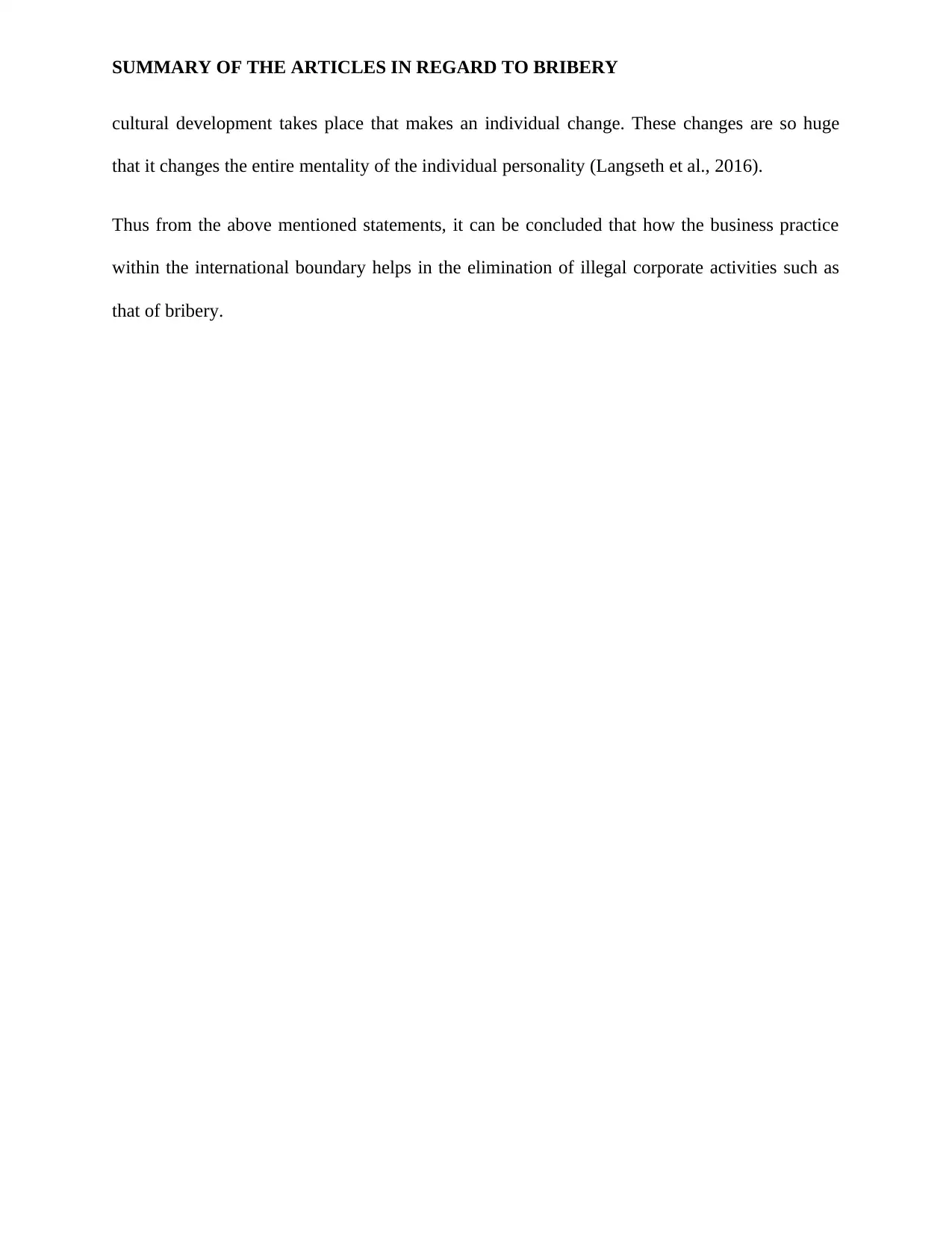
SUMMARY OF THE ARTICLES IN REGARD TO BRIBERY
cultural development takes place that makes an individual change. These changes are so huge
that it changes the entire mentality of the individual personality (Langseth et al., 2016).
Thus from the above mentioned statements, it can be concluded that how the business practice
within the international boundary helps in the elimination of illegal corporate activities such as
that of bribery.
cultural development takes place that makes an individual change. These changes are so huge
that it changes the entire mentality of the individual personality (Langseth et al., 2016).
Thus from the above mentioned statements, it can be concluded that how the business practice
within the international boundary helps in the elimination of illegal corporate activities such as
that of bribery.
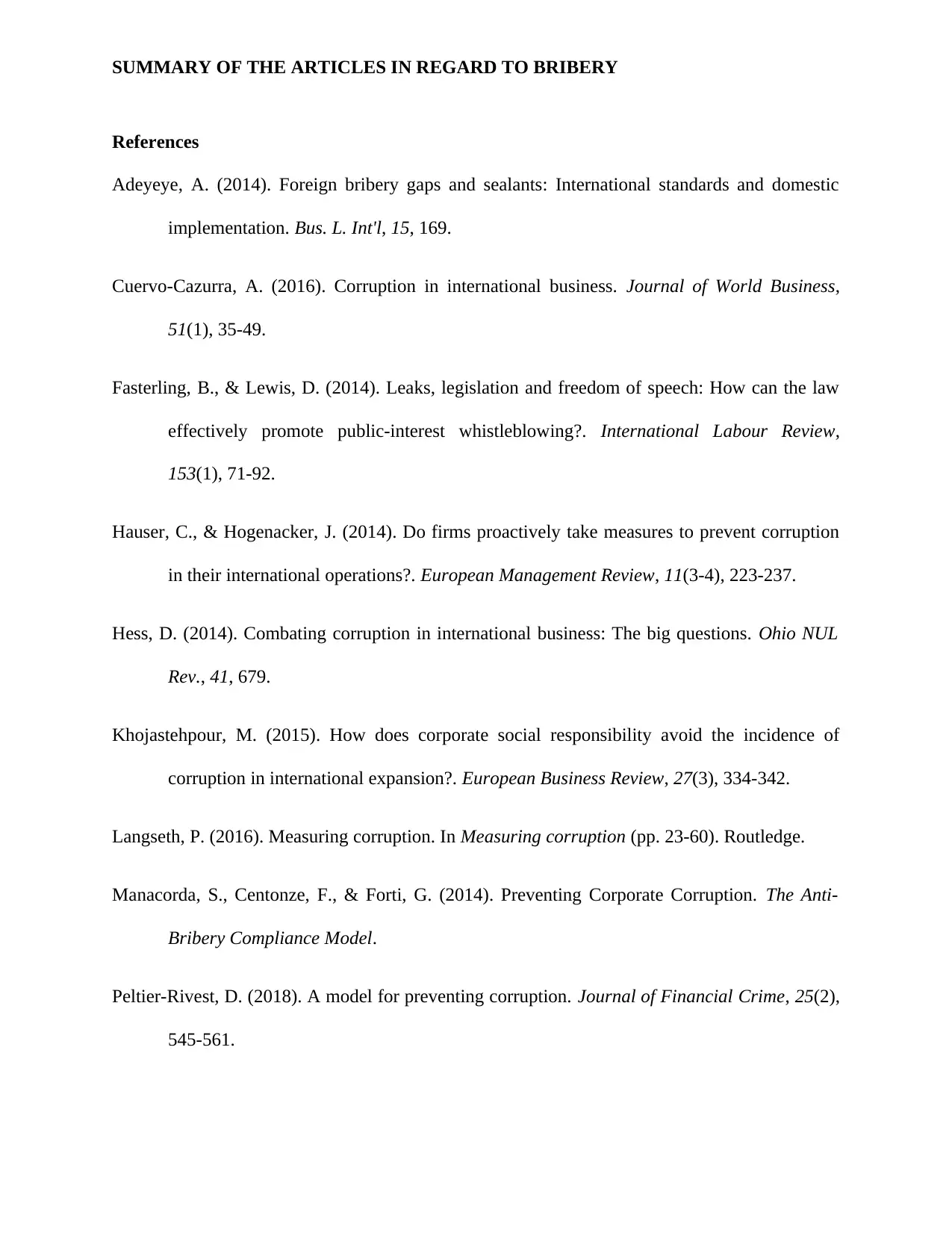
SUMMARY OF THE ARTICLES IN REGARD TO BRIBERY
References
Adeyeye, A. (2014). Foreign bribery gaps and sealants: International standards and domestic
implementation. Bus. L. Int'l, 15, 169.
Cuervo-Cazurra, A. (2016). Corruption in international business. Journal of World Business,
51(1), 35-49.
Fasterling, B., & Lewis, D. (2014). Leaks, legislation and freedom of speech: How can the law
effectively promote public‐interest whistleblowing?. International Labour Review,
153(1), 71-92.
Hauser, C., & Hogenacker, J. (2014). Do firms proactively take measures to prevent corruption
in their international operations?. European Management Review, 11(3-4), 223-237.
Hess, D. (2014). Combating corruption in international business: The big questions. Ohio NUL
Rev., 41, 679.
Khojastehpour, M. (2015). How does corporate social responsibility avoid the incidence of
corruption in international expansion?. European Business Review, 27(3), 334-342.
Langseth, P. (2016). Measuring corruption. In Measuring corruption (pp. 23-60). Routledge.
Manacorda, S., Centonze, F., & Forti, G. (2014). Preventing Corporate Corruption. The Anti-
Bribery Compliance Model.
Peltier-Rivest, D. (2018). A model for preventing corruption. Journal of Financial Crime, 25(2),
545-561.
References
Adeyeye, A. (2014). Foreign bribery gaps and sealants: International standards and domestic
implementation. Bus. L. Int'l, 15, 169.
Cuervo-Cazurra, A. (2016). Corruption in international business. Journal of World Business,
51(1), 35-49.
Fasterling, B., & Lewis, D. (2014). Leaks, legislation and freedom of speech: How can the law
effectively promote public‐interest whistleblowing?. International Labour Review,
153(1), 71-92.
Hauser, C., & Hogenacker, J. (2014). Do firms proactively take measures to prevent corruption
in their international operations?. European Management Review, 11(3-4), 223-237.
Hess, D. (2014). Combating corruption in international business: The big questions. Ohio NUL
Rev., 41, 679.
Khojastehpour, M. (2015). How does corporate social responsibility avoid the incidence of
corruption in international expansion?. European Business Review, 27(3), 334-342.
Langseth, P. (2016). Measuring corruption. In Measuring corruption (pp. 23-60). Routledge.
Manacorda, S., Centonze, F., & Forti, G. (2014). Preventing Corporate Corruption. The Anti-
Bribery Compliance Model.
Peltier-Rivest, D. (2018). A model for preventing corruption. Journal of Financial Crime, 25(2),
545-561.
⊘ This is a preview!⊘
Do you want full access?
Subscribe today to unlock all pages.

Trusted by 1+ million students worldwide
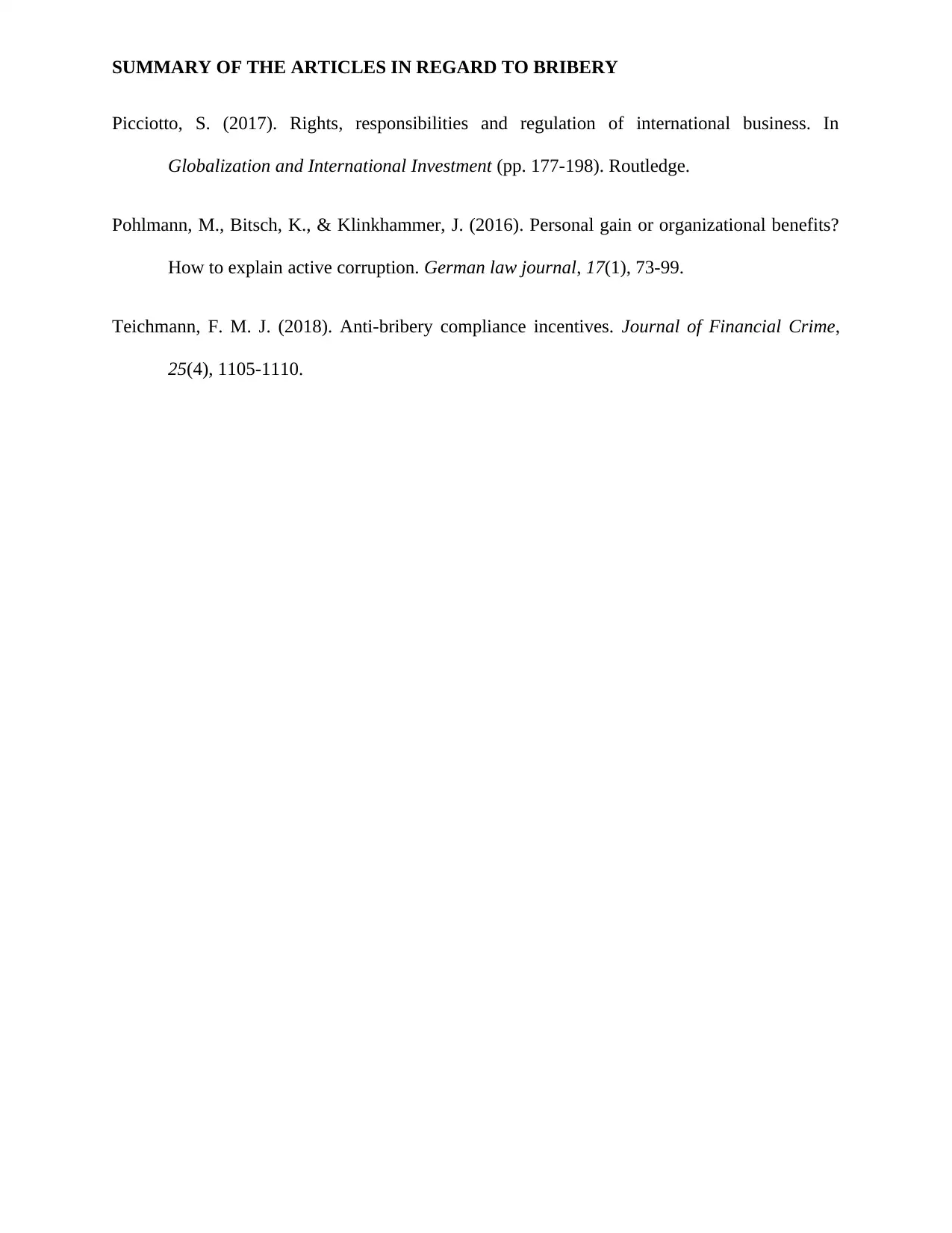
SUMMARY OF THE ARTICLES IN REGARD TO BRIBERY
Picciotto, S. (2017). Rights, responsibilities and regulation of international business. In
Globalization and International Investment (pp. 177-198). Routledge.
Pohlmann, M., Bitsch, K., & Klinkhammer, J. (2016). Personal gain or organizational benefits?
How to explain active corruption. German law journal, 17(1), 73-99.
Teichmann, F. M. J. (2018). Anti-bribery compliance incentives. Journal of Financial Crime,
25(4), 1105-1110.
Picciotto, S. (2017). Rights, responsibilities and regulation of international business. In
Globalization and International Investment (pp. 177-198). Routledge.
Pohlmann, M., Bitsch, K., & Klinkhammer, J. (2016). Personal gain or organizational benefits?
How to explain active corruption. German law journal, 17(1), 73-99.
Teichmann, F. M. J. (2018). Anti-bribery compliance incentives. Journal of Financial Crime,
25(4), 1105-1110.
1 out of 10
Related Documents
Your All-in-One AI-Powered Toolkit for Academic Success.
+13062052269
info@desklib.com
Available 24*7 on WhatsApp / Email
![[object Object]](/_next/static/media/star-bottom.7253800d.svg)
Unlock your academic potential
Copyright © 2020–2026 A2Z Services. All Rights Reserved. Developed and managed by ZUCOL.




